الأسواق
عند تصميم تدخل إنساني وتحديد ما إذا كان سيتم استخدام المساعدات النقدية والقسائم، يجب أن يكون تحليل السوق جزءًا من تحليل الاستجابة الشامل. وثبت أن دعم الأسواق للعمل بشكل جيد يؤدي إلى تعافي أسرع وزيادة المرونة في المناطق المتضررة من الكوارث.
واستثمرت العديد من المنظمات في تطوير أدوات لدعم تحليل السوق وتفكر في البرمجة القائمة على السوق بشكل أكثر شمولية. يشمل ذلك التدخلات التي تستخدم السوق (مثل التحويلات النقدية إلى السكان المتضررين)، بالإضافة إلى التدخلات التي تدعم الأسواق بشكل مباشر (مثل المنح المشروطة للمتداولين لإعادة تشغيل أسواقهم).
Related initiatives
Featured content

Introduction to Market Analysis
دورة تدريبية
This 30 minute online course provides an introduction to the analysis of markets in emergency contexts, with input from some of the world’s leading thinkers on the topic.

A Practical Guide to Market Analysis in Humanitarian response
دورة تدريبية
A three to four hour online course designed to provide future humanitarian market assessment team members with a solid understanding of theory and steps of market assessments so that they can join assessment teams prepared with a basic understanding of what they will be doing and why.
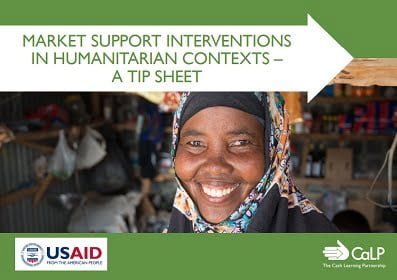
Market Support Interventions in Humanitarian Contexts – a Tip Sheet
Guidelines and Tools
This tip sheet defines what market support programming in humanitarian contexts is, and what it can look like in practice. It enables humanitarian practitioners to systematically consider market support interventions alongside other programme activities. The scope includes support interventions focusing on supply/availability and on demand/access. The tip sheet is based on secondary data...
Latest
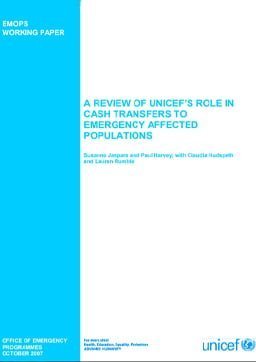
A Review of UNICEF’s Role in Cash Transfers to Emergency Affected Populations
Report
This paper is part of an ongoing process exploring UNICEF’s engagement with cash-based responses in emergencies. The main aim of the paper is to stimulate discussion on the potential role of cash transfers within UNICEF’s response to emergencies.
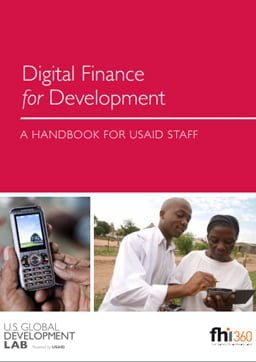
Digital Finance for Development: A Handbook for USAID Staff
Guidelines and Tools
This handbook is designed to enable USAID personnel to maximize the Agency’s use of and contribution to the growth of digital financial services in emerging markets around the world. As an Agency, USAID brings significant comparative advantages to the collective effort required to build out financial...
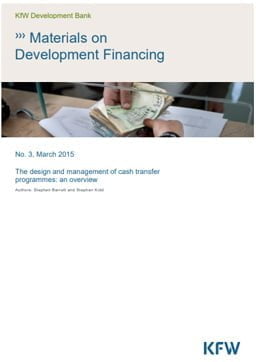
The Design and Management of Cash Transfer Programmes: An Overview
Policy paper
This paper describes and explains the operations of cash transfer schemes, outlining good practice in the design processes required to operationalize policy-level design principles. It describes the four key components comprising the administrative structure of most cash transfer programmes and, based on...
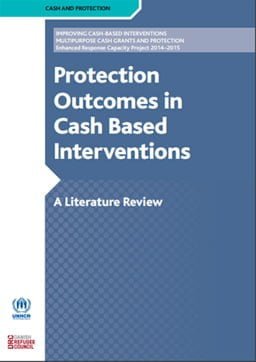
Protection Outcomes in Cash-based Interventions: A Literature Review
Report
This literature review examines existing research to determine whether the use of cash and vouchers is contributing to the promotion of protection and gender outcomes for beneficiary communities, following the WFP and UNHCR 2013 study on gender, protection and cash. This literature review focuses on these...
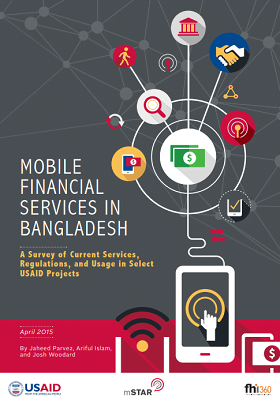
Mobile Financial Services in Bangladesh
Report
This report is the consolidation of findings derived from desk research and face-to-face interviews with key mobile financial services providers, telecom operators, technology platform providers, regulators, and USAID health and agriculture project staff and beneficiaries.
The objective of this report is...

Market Analysis Application in WASH Response
Report
Markets are an important aspect of the livelihood where the majority of the world’s population depend upon. During disaster, market recovery is critical where it indicates the recuperation that livelihood, jobs and businesses rely upon. Humanitarian actors need to factor market analysis into their...
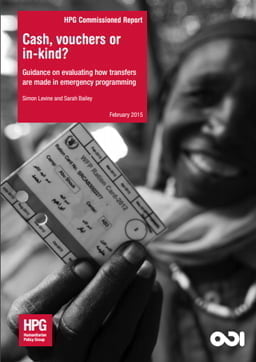
Cash, Vouchers or In-Kind? Guidance on Evaluating How Transfers are Made in Emergency Programming
Guidelines and Tools
In humanitarian settings, aid agencies often assist populations by transferring resources, usually using cash, vouchers or in-kind aid, such as food rations, shelter materials, seeds and tools and kits of household items. The use of cash or vouchers to replace in-kind aid is most pronounced in food...

State of the Use of Mobile Technologies for Disaster Preparedness in South East Asia
Report
This report summarizes the study conducted by Nanyang Technology University (NTU) in collaboration with the Global Disaster Preparedness Center with support from the USAID-Office of Foreign Disaster Assistance to better understand how new communication and information sharing technologies can enhance risk...
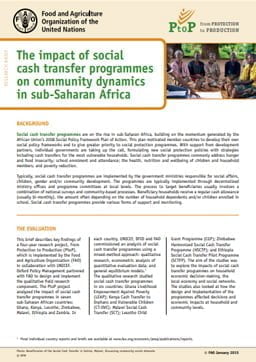
The Impact of Social Cash Transfer Programmes on Community Dynamics in Sub-Saharan Africa
Report
Social cash transfer programmes are on the rise in sub-Saharan Africa, building on the momentum generated by the African Union’s 2008 Social Policy Framework Plan of Action. This plan motivated member countries to develop their own social policy frameworks and to give greater priority to social...
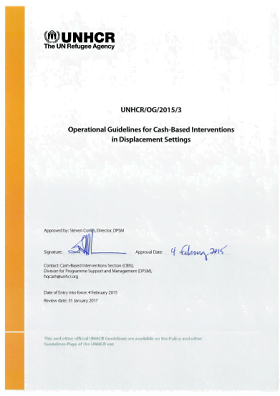
Operational Guidelines for Cash-Based Interventions in Displacement Settings
Guidelines and Tools
These operational guidelines support UNHCR and partner staff to determine if and when cash-based interventions (CBIs) are appropriate to meet the needs of refugees and other persons of concern and aids the design and implementation of effective programmes. It focuses on the needs of refugees, but can...
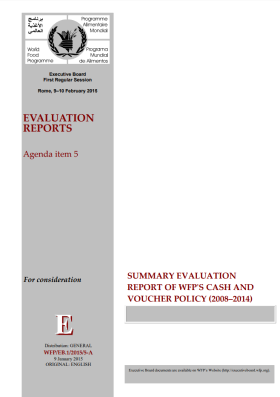
Summary Evaluation Report of WFP’s Cash and Voucher Policy (2008-2014)
Report
The WFP’s Summary Evaluation Report on cash and voucher policy (2008-2014) was commissioned by WFP’s Office of Evaluation in order to assess the quality and results of the policy and its implementation. The evaluation found that although the policy does not represent WFP’s current best...
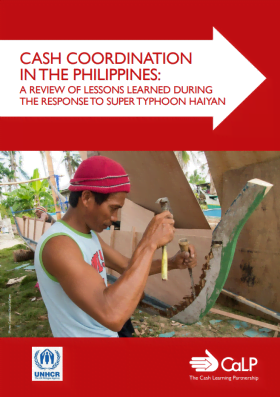
Cash Coordination in the Philippines: A review of lessons learned during the response to Super Typhoon Haiyan
Report
In the last five years there has been a growing trend towards the use of cash transfer programming (CTP) as a response modality in emergencies across the humanitarian sector. The fungibility of cash, when provided without restrictions, offers increased choice for affected populations to...

Electronic Cash Grants in Emergencies: Approaches and lessons learned
Report
Cash distributions in an emergency: A concept that seems so obvious today yet has only recently gained recognition within humanitarian response programming for its speed, efficiency and—above all—effectiveness.
This document provides a snapshot for humanitarian response peers on best practices,...

Remittances to Syria: What works, where and how
Report
This study sought to understand remittance flows into Syria, and established that various Informal Value Transfer Systems (IVTS) are used, to the exclusion of the formal banking sector. Registered and unregistered hawala, courier services and family connections are used. Remittances have played an...

Review of Targeting of Cash and Food Assistance for Syrian Refugees in Lebanon, Jordan and Egypt
Report
This report is an output of a consultancy to review the process of developing protocols for targeting cash and food assistance to Syrian refugees in Lebanon, Egypt and Jordan during 2014. Under the auspices of the High Level Meeting between WFP and UNHCR (May 2014) and the WFP and UNHCR Joint Action...
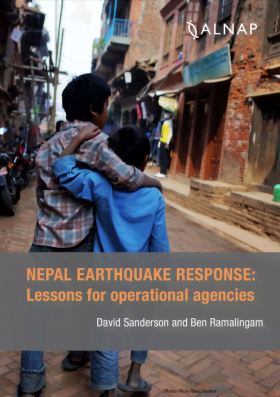
Nepal Earthquake Response: Lessons for operational agencies
Policy paper
In the aftermath of the April 2015 earthquake in Nepal, this paper looks at lessons drawn from previous comparable disasters and seeks to provide invaluable information and assistance to the operational agencies responding to the crisis. Seventeen Lessons give an overview of important learnings based on...

Documentation and Learning: Rapid emergency assistance to Typhoon Ruby (Hagupit) affected communities in the province of Samar, Philippines April 2015
Report
The documentation and learning study identifies good practices and lessons from the implementation of the Rapid Emergency Assistance to Typhoon Ruby (Hagupit) Affected Communities in the Province of Samar by Christian Aid (CA) and its local NGO partners – Coastal Core Incorporated (CCI), Center for...

Final Report for Assessment of the Impact of Cash For Work Beneficiaries training for Phases IIB and IV
Report
Phases IIB and IV of the Cash For Work (CFW) project were implemented by FAO Somalia over the period 2013-2015 and aimed at enhancing access to food by the food insecure households in the short-term, while supporting restoration of food production through the rehabilitation/construction of productive...

Capacity Building Theory Of Change
Guidelines and Tools
Capacity Building is a foundation of the CALP Network’s vision, focus and mandate, and our Capacity Building Strategy emanates from a Theory of Change that describes how the CALP Network’s inputs and activities result in short-term outcomes and can lead to long-term outcomes and ultimate impact. The...
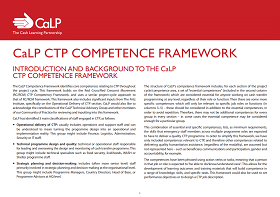
The CALP Network CTP Competence Framework
Guidelines and Tools
The CALP Network Competence Framework identifies core competences relating to CTP throughout the project cycle. This framework builds on the Red Cross/Red Crescent Movement (RC/RCM) CTP Competency Framework, and uses a similar project-cycle approach to that of RC/RCM framework. This framework also...